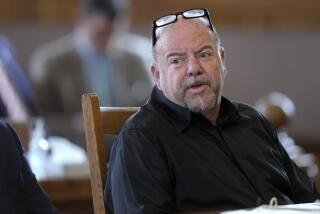FCC Slams Back Hard in ‘Slamming’ Case
- Share via
WASHINGTON — In the biggest crackdown to date against “slamming”--the unauthorized switching of consumers’ long-distance service--the Federal Communications Commission on Tuesday for the first time revoked a long-distance carrier’s operating licenses and levied a record $5.7 million in fines against the companies’ mysterious owner.
Now all they have to do is find him. Once a resident of Sterling, Va., Daniel Fletcher, 29, hasn’t been heard from since he left a voicemail message at the FCC two years ago, officials there say. He has used post office addresses in Washington, Virginia and Texas and hasn’t responded to repeated agency queries.
“We have no idea” of his whereabouts, said a person at his parents’ home in Sterling on Tuesday.
“This is a truly bad actor,” said FCC Chairman William E. Kennard. “He is a fellow who clearly had intent to violate the FCC’s rules and we’re hitting him hard.”
Such tough talk is uncharacteristic of the FCC, which typically enforces rules with polite letters requesting information. Its previous highest fine for slamming was $500,000, against a firm that settled without admitting wrongdoing.
Investigators allege that Fletcher at one point switched 500,000 consumers to his long-distance company without authorization. In total, they say, Fletcher’s customers ran up bills of nearly $20 million. His firms leased bulk capacity from big companies such as AT&T; Corp. and Sprint Corp., then skipped out owing the big companies about $4 million.
Slamming is an old problem that continues to grow despite periodic FCC action. The agency received 20,000 complaints in 1997, a 56% increase from the previous year.
Fletcher has been scrutinized by the Senate Governmental Affairs Subcommittee on Investigations, which is planning a hearing Thursday to highlight how the FCC failed to deal forcefully with him after three years of complaints.
According to investigators, Fletcher sold service under as many as 10 brand names. He typically gave his businesses vague names such as Phone Calls Inc. and Monthly Phone Services Inc. that might escape the attention of those who only glance at their phone bills. Other names included the Christian Consumer Network and Charity Long Distance.
Investigators say Fletcher probably fled the country after obtaining a passport in June 1996.
He allegedly often got customers by having them fill out contest entry forms, whose fine print constituted permission to switch carriers. Or his telemarketers would call people at home, and even if they declined to switch, switch them anyway.
Though the FCC received 1,400 slamming complaints against Fletcher, a high number for a small carrier, complaints against big companies with many more customers are far more numerous.
More to Read
Inside the business of entertainment
The Wide Shot brings you news, analysis and insights on everything from streaming wars to production — and what it all means for the future.
You may occasionally receive promotional content from the Los Angeles Times.










